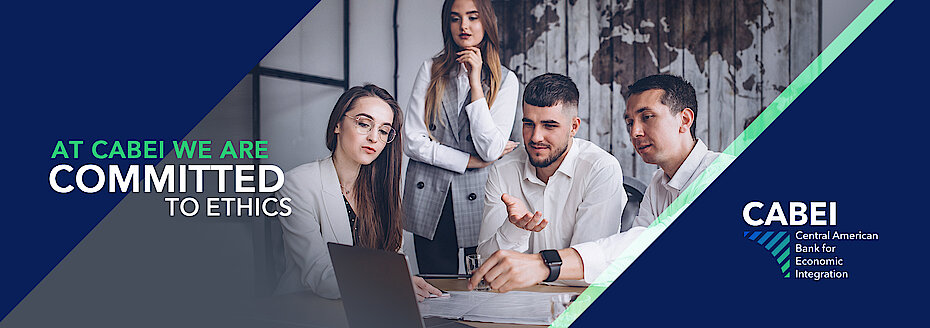Ethics at CABEI
CABEI, as part of its commitment to the economic and social development of the region, promotes its personnel to conduct management based on its Code of Ethics, underpinning its actions on the parameters established in line with ethical values, institutional principles and behavior standards, guaranteeing a transparent, integral and committed performance from the Bank’s officials.
About Us
The Ethics Office (OET for its acronym in Spanish), is an office attached to CABEI’s Board of Directors. Its mission is to promote an ethical culture that allows all Bank members to perform their duties pursuant to the highest ethical standards.
The basic principles of the Ethics Office at CABEI are:
• Independence.
• Tolerance.
• Fairness in treatment.
• Confidentiality.
• Professionalism
What do we do?
The Ethics Office is responsible for:
• Providing advice and guidance to all Bank instances on issues of the Code of Ethics, institutional principles, values and behavior standards at all levels.
• Guiding, raising awareness, developing, promoting, communicating CABEI’s ethics culture, aimed at preventing rather than sanctioning, using mediation and training as a tool.
• Managing prevention and protection mechanisms for retaliation.
• The reception, analysis and investigation of reports or complaints attributed to Bank personnel, pursuant to the procedure regulated in the Code of Ethics, on conduct allegedly contrary to the Code of Ethics and other related regulations.
Ensure the inclusion of conflicts of interest management controls (identification, treatment and consultation) in the internal processes of the Bank.
The Ethics Committee is the body responsible for knowing and solving matters related to violations of the Code of Ethics.
CABEI has an Ethics Committee that is created depending on who is pointed out or reported; therefore, the following types have been defined:
- The Bank’s Ethics Committee.
- Ethics Committee for Director, Controller and Executive President.
- Special Ethics Committee for the Legal Counsel or Ethics Officer
In the setting of regulatory compliance regarding internal and external conduct, CABEI establishes a series of rules and regulations in order to avoid or manage faults from personnel:
- Code of ethics
- Conflict of interest management policy
Likewise, CABEI has a list of required positions that must present their Statement of Financial Position under resolution DI-74/2020 and Declaration of Conflict of Interest on an annual basis, which allow the prevention and mitigation of situations that compromise ethics at the Bank.
The dissemination of financial information, administered confidentially, is a preventive agent against practices that invite CABEI’s employees to benefit from businesses, activities or affiliations related to the institution.
Additionally, the OET conducts annual monitoring about the knowledge that personnel must have about the Code of Ethics and, with the support of recognized leaders in ethics issues, trains its more than 400 collaborators, with the purpose of annually certifying the commitment of CABEI members in promoting an ethical culture and its correct performance.
As part of the commitment to maintain ethical and compliance standards, CABEI became a member of the Ethics Network of Multilateral Organizations (ENMO) for its good ethics practices.
- Email: denunciasbcie@externo.bcie.org
- Reporting Channel: Click Here
Code of Ethics
Complementary Regulations and Procedures to the Code of Ethics OK
Complementary Regulations and Procedures to the Code of Ethics



